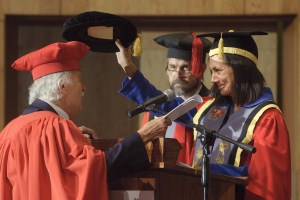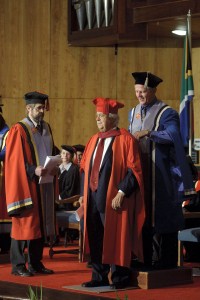Posted on December 14, 2011
The LLM programme is presented by the University’s Centre for Human Rights, Faculty of Law, in partnership with 12 universities throughout the continent.
These universities are: Université d'Abomey-Calavi (Benin), Addis Ababa University (Ethiopia), American University in Cairo (Egypt), Catholic University of Central Africa (Cameroon), Universidade Eduardo Mondlane (Mozambique), Université Gaston Berger de Saint Louis (Senegal), University of Ghana, University of Lagos (Nigeria), University of Mauritius, Makerere University (Uganda), University of Venda (South Africa) and the University of the Western Cape (South Africa).
In her address preceding the graduations, the Vice-Chancellor and Principal, Prof Cheryl de la Rey, said during the 2011 academic year, the University of Pretoria has awarded close to 14 000 degrees, including over 6 000 postgraduate degrees and about 190 doctoral degrees.
Prof De la Rey described graduation day as a very important day in the life of both the students and the institution, mainly because it is a milestone in the graduates’ career. “When a person graduates, it signifies the end of one phase of life and the beginning of a new one – be that phase a further level of studying or going on to a different career,” Prof De la Rey said.
She further stated that the graduation of LLM students is particularly special to the University because it focuses on the very important issue of human rights. She however said that many decades after the Declaration, women and children are still denied their basic right. She therefore called on the graduates to make a difference in the world by ensuring that everyone has access to human rights.
“As graduates of this programme, we are looking forward to the contribution that you will make in your various leadership and professional roles to ensure a better world where every man, every woman and every child will have access to basic human rights,” Prof De la Rey said.
Advocate George Bizos’ stern warning to the State
Shortly after being awarded an honorary doctorate by the University of Pretoria, Advocate George Bizos delivered a paper entitled “Blame neither the Constitution nor the Courts”. He called on Government not to undermine the judiciary, as this was done previously by the apartheid regime. He also said the judiciary should remain independent and free of political interference.
In trying to illustrate the tensions between the executive and the judiciary in South Africa, Advocate Bizos cited criticisms levelled against the Constitution and the courts made by the Secretary-General of the ANC, Mr Gwede Mantashe. During an interview with the Sowetan, Mantashe said that “. . . the judiciary is actually consolidating opposition to Government” and that “there is a great deal of hostility that comes through from the judiciary towards the executive and Parliament,” and that judges were “reversing the gains of transformation through precedents”.
He also cited a speech given by President Jacob Zuma during a parliamentary hearing to bid farewell to Chief Justice Sandile Ngcobo and to welcome the new Chief Justice, Mogoeng Mogoeng. President Zuma stated the following: “We also wish to reiterate our view that there is a need to distinguish the areas of responsibility between the judiciary and the elected branches of the State, especially with regard to policy formulation. Our view is that the executive, as elected officials, has the sole discretion to decide policies for Government.”
Advocate Bizos said such criticisms had led to a number of recent lectures and papers on the role of the judiciary and the executive.
He said although there had been previous tensions between the executive and the judiciary in South Africa dating back to the apartheid regime, the current regime should not emulate what was done previously. “I hope that our current ruling party does not intend to follow the apartheid regime’s example, but I do have some concerns. The courts as well as the individuals and organisations that bring human rights cases against the executive, to whom some impute false motives, have been subject to severe criticisms bordering on demonisation,” Advocate Bizos said.
On the remarks made by President Jacob Zuma that the executive had the sole discretion to decide policies for the Government, Advocate Bizos cited his friend and fellow advocate, Geoff Budlender, who said, “The theory that the executive has a monopoly of wisdom on policy questions, based on a democratic mandate, strikes me as somewhat remote from reality.”
Advocate Bizos further mentioned that in terms of the Constitution, the Constitutional Court has no right to formulate government policy, but it does have the right to adjudicate whether the implementation of government policy results in the deprivation of rights.
Since its inception, the Constitutional Court has invalidated a number of government laws and actions, continued Advocate Bizos. He cited the recent ruling by a five-judge panel of the Supreme Court of Appeal, which declared President Zuma’s appointment of Advocate Menzi Simelane as National Director of Public Prosecutions to be unlawful. “The decision serves as a reminder to the President that he is not above the law,” he said.
Advocate Bizos also slammed the recent announcement made by the Cabinet that it will appoint a body to assess the decisions of the Constitutional Court. He said the undefined and vague assessment body risks repeating our unhappy history, and it may be construed as a challenge to the independence of the judiciary, a value that we as South Africans should hold very dear.
“Because judges are not infallible, that is why we have superior courts to which one can appeal. There is no reason to establish a new oversight body not provided for in the Constitution. Nobody likes losing a case but this idea of assessing the decisions of the Constitutional Court, or any other court for that matter, is neither prudent nor wise. Any such assessment body would take the people of South Africa down a road that is unconstitutional, unreasonable, unsustainable, and that must be construed as nothing less than a resurgence of the methods of the apartheid regime,” Advocate Bizos stated.
Advocate Bizos said the idea of assessing the courts is completely contradictory to the spirit, purpose and object of the Constitution and to the Legacy of the former South African President Nelson Mandela. He advised those who will be responsible for conceiving of the assessment body to read section 165 of the Constitution, which guarantees the independence of our courts.
Advocate Bizos concluded his lecture by saying the pursuit of justice is a never-ending struggle and “in defining our rights, there will of course be times when we disagree, but each day, through court judgements and public dialogue, we reinforce the shared values in our Constitution that unite us as a country. If we follow the Constitution, our most fundamental law, I am optimistic that we will not go wrong”.


Copyright © University of Pretoria 2025. All rights reserved.
Get Social With Us
Download the UP Mobile App